
B2B Marketing
21 Jun By the Numbers: Why SEO Isn’t Dead
 With social media usage growing 356% in the past six years, companies are spending a lot more time crafting, cultivating, and fine-tuning their messages to reach target audiences on their social sites. Whether it’s to gain more followers, increase customer engagement, or boost sales, an effective social media strategy is critical to a business’ growth and success.
But what about search engine optimization (SEO) strategies? Are brands still leveraging the power of SEO to increase the discovery of their content through search engines? In general, should companies be betting on more than social?
Absolutely. Although social media marketing is exploding, SEO techniques remain highly relevant in 2016. In fact, search is still the leading referrer to the majority of websites. According to Kissmetrics, more people look for business through search than on social media. If your company neglects effective SEO strategies, you are leaving lots of leads, prospects, and money on the table.
If you're still not convinced, read the below 16 stats, which prove that SEO is not dead and demonstrate how its application is vital to your digital marketing strategy.
With social media usage growing 356% in the past six years, companies are spending a lot more time crafting, cultivating, and fine-tuning their messages to reach target audiences on their social sites. Whether it’s to gain more followers, increase customer engagement, or boost sales, an effective social media strategy is critical to a business’ growth and success.
But what about search engine optimization (SEO) strategies? Are brands still leveraging the power of SEO to increase the discovery of their content through search engines? In general, should companies be betting on more than social?
Absolutely. Although social media marketing is exploding, SEO techniques remain highly relevant in 2016. In fact, search is still the leading referrer to the majority of websites. According to Kissmetrics, more people look for business through search than on social media. If your company neglects effective SEO strategies, you are leaving lots of leads, prospects, and money on the table.
If you're still not convinced, read the below 16 stats, which prove that SEO is not dead and demonstrate how its application is vital to your digital marketing strategy.
20 Jun Account-Based Marketing: 26 Useful Resources
What is account-based marketing? ABM has been generating quite a bit of buzz in the B2B marketing community over the last couple years—and for good reason. ABM increases marketing and sales alignment and leads to closing bigger deals with individual customers, by rejecting the wide-net strategy of broadcasting messages to huge audiences in favor of targeting individual customer accounts on a 1:1 basis. According to a recent survey, 92% of B2B marketers now recognize the value of account-based marketing. But there's a major gap between perceived value and implementation; only 20% of the same survey pool had full ABM plans in place. In other words, marketers love the concept, but have not yet implemented it themselves. Fortunately for them, new tools like Terminus, DemandBase, and Lean Data have made it easy for business of all sizes to utilize and scale the strategy. Plus, the recent resurgence of ABM has created a wave of information on the subject. Whether you're a B2B or B2C marketer, it's worth learning more about how you can implement ABM tactics. We've compiled 26 useful resources.



